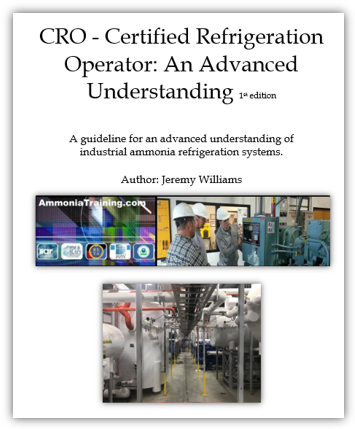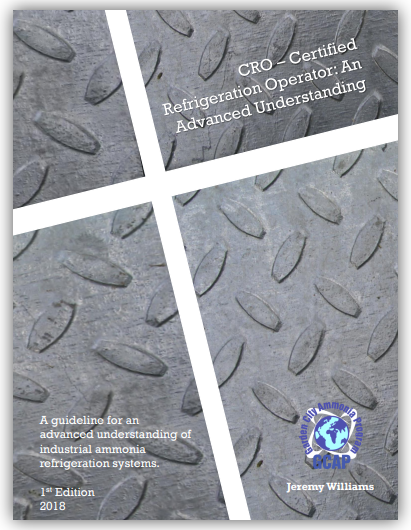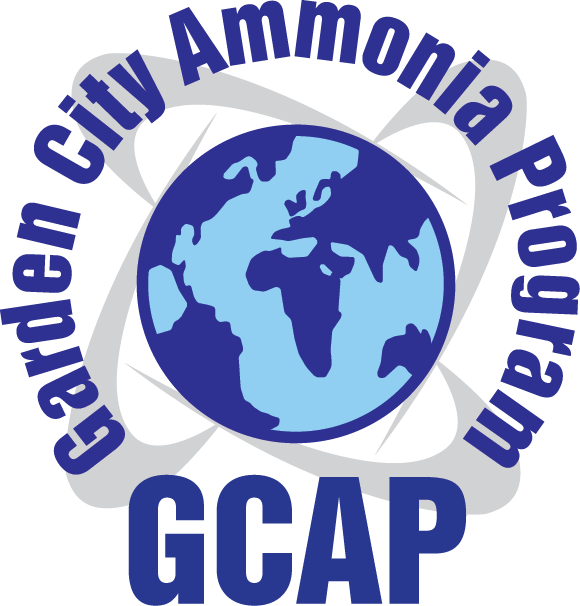 It is finished!!! The anticipated new book for GCAP’s level 2 ammonia refrigeration class is now available. It is the first edition of its kind titled “CRO -Certified Refrigeration Operator: An Advanced Understanding“. The text has been almost two years in the making and last week was debut to the classroom for the first time. The class was a great success and we look forward using this book as a tool to continue driving forward the success of ammonia refrigeration training. GCAP will offer the traditional RETA courses as well and they will be called RETA 1 and RETA 2.
It is finished!!! The anticipated new book for GCAP’s level 2 ammonia refrigeration class is now available. It is the first edition of its kind titled “CRO -Certified Refrigeration Operator: An Advanced Understanding“. The text has been almost two years in the making and last week was debut to the classroom for the first time. The class was a great success and we look forward using this book as a tool to continue driving forward the success of ammonia refrigeration training. GCAP will offer the traditional RETA courses as well and they will be called RETA 1 and RETA 2.
The text is 11 Chapters and 476 pages in total length. If you would like to get yours mailed out please call 620.271.0037
- Mechanical Integrity
- Heat Transfter
- Psychrometrics
- Enthalpy
- Low Side Vessels
- Low Side Valves
- DX Systems
- Flooded Systems
- Reticulated Systems
- Defrost Applications
- Practice Test
Introduction and about the Author
Welcome to a training experience that we have designed for the advanced industrial refrigeration operators, technicians, managers, engineers, and safety professionals. Many of us learned what we know about an Ammonia system from watching and listening to someone more senior than ourselves. Dedicating my life to education since 2007 I have found that there are some great people in this field and I owe many of them thanks for investing in myself. All it takes is a chance and desire and the sky is the limit for an industrial refrigeration career.
“We may throw the dice, but the Lord determines how they fall”
Proverbs 16:33
 My involvement in refrigeration began as a young kid. My father (Randy Williams) owned and operated a successful contracting company in the state of Texas. It was based out of the panhandle and focused on residential, commercial, and industrial heat transfer applications. Like all young boys, I yearned to be with my dad, and that meant I got to see a lot of things and be exposed to many experiences most do not. I went with him many weekends and during the summers. We had a shop in the backyard where most of the packages were built and I learned to work with my hands and think with my mind. Beyond believing I was working (actually helping) at $2 an hour, one of my fondest childhood memories working with my dad was sitting behind him on a spare tire that was located behind the driver’s seat of a service van moving along the highway listening to country music making our way to the next job.
My involvement in refrigeration began as a young kid. My father (Randy Williams) owned and operated a successful contracting company in the state of Texas. It was based out of the panhandle and focused on residential, commercial, and industrial heat transfer applications. Like all young boys, I yearned to be with my dad, and that meant I got to see a lot of things and be exposed to many experiences most do not. I went with him many weekends and during the summers. We had a shop in the backyard where most of the packages were built and I learned to work with my hands and think with my mind. Beyond believing I was working (actually helping) at $2 an hour, one of my fondest childhood memories working with my dad was sitting behind him on a spare tire that was located behind the driver’s seat of a service van moving along the highway listening to country music making our way to the next job.
During high school I held various jobs and my senior year my parents moved away to proceed to their next adventure. I was valedictorian of my graduating class and had several college scholarships awarded. My dad was an instructor teaching industrial refrigeration at a junior college in Kansas and I jumped on the opportunity to take several industrial courses. After these training seminars, long story short, I walked away from my scholarship opportunities and went to work at beef processing plant in Liberal, Kansas. I was hired for utilities and had quickly became part of the kill floor maintenance team on the graveyard shift. I saw and learned so much in that next year, and one thing I did come to understand was that I was not going to be moved to the refrigeration department as I had planned, so I decided to give college a chance.
My next goal was to earn a college degree. I enrolled in Oklahoma City Community College and landed my associates degree in science and math in 2004. I tried few semesters at the University of Oklahoma, but I felt as I was just a number and being a diehard Texas Longhorn fan, it just wasn’t right. I switched my major for my bachelors from engineering to finance and economics. In 2005, I met whom today I call the mother of my 5 children and transferred to the University of Central Oklahoma where she went to school. It was the best decision of my entire life. In 2006 I received my bachelors with honors.
 I continued working and started to pursue the idea of what we call GCAP. In about a years’ time, I had graduated college, my fiancé and I found out we were expecting two weeks before the wedding, moved 350 miles, became a father, and the rest is what we call history. My wife is the best thing that has ever happened to me and I thank God daily for her wisdom and her spiritual guidance. She is everything Proverbs 31 explains.
I continued working and started to pursue the idea of what we call GCAP. In about a years’ time, I had graduated college, my fiancé and I found out we were expecting two weeks before the wedding, moved 350 miles, became a father, and the rest is what we call history. My wife is the best thing that has ever happened to me and I thank God daily for her wisdom and her spiritual guidance. She is everything Proverbs 31 explains.
So, it had seemed like the circle had started to roll over again. GCAP was in its infancy, and the risk my father and mother took to start a school in Garden City, competing with the world famous junior college was just crazy. The Lord has blessed this opportunity from day one and the blessing continues to thrive. We worked together building systems and equipment, he taught me how to teach and not only teach but to make sure that you can say it in a way that a mechanic can understand. In 2008 during the big recession we decided to build the boiler lab and classroom. Today we have 8 live boilers that make up the boiler division.
For my entire career and life, if thermodynamics where involved, I have to give a huge thanks to my dad. Everything that I have been able to accomplish is because of his support and guidance. I dedicate this book to him and GCAP has the sole rites for use educating industrial refrigeration personnel. Working with family and my dad has been great but is has not been easy. I ask for God’s blessing to continue and pray that I have many more years for my parents to keep mentoring their learned skills and avoidances of past mistakes.
We hope that you had the time and dedication to read the first book and self-study it over many times before attempting this manual. It you are studying this book with the corresponding course things will move fast. Remember, ask questions, make your comments, and take advantage of the associated equipment and hands-on labs. If you are self-studying this material please move at your own pace. Absorb as much material as you can and if you ever have a question please feel free to reach out to the staff here at GCAP for assistance.
– If you can’t explain it simply, you don’t know it well enough.
– Education is not the learning of facts, but the training of the mind to think.
– Stay away from negative people, they have a problem for every solution.
Albert Einstein
Jeremy Williams: Directing Manager / Instructor at GCAP, – Author
While there are many people who have contributed to this work, I would like to specifically thank:
Randy Williams, CEO/President/Co-Owner of Garden City Ammonia Program /My dad and mentor
Rachel Williams, Office Manager/Co-Owner of Garden City Ammonia Program / My mom and mentor
Melanie Williams, Wife and partner in this thing we call life whom has support my career since day one
Kristen De La Peña, Office Director at Garden City Ammonia Program, The backbone of GCAP and offered refinements throughout the text.
Dr. Reuben McGilvary, PSM/RMP Compliance Instructor at GCAP, who offered refinements throughout the text.
Anthony Verdugo, Refrigeration Instructor at GCAP, who offered refinements throughout the text.
GCAP Instructors, To all the GCAP instructors who have dedicated their life to giving back to the industry by what they have experienced.
GCAP Students, Anyone who takes our classes at GCAP teaches us a little bit more about the art and science of ammonia refrigeration. Without them, this book would not have been possible.
The Ammonia Refrigeration Industry, To all the great people who have shared their thoughts, concerns, suggestions, pictures, and most of all their expectations of the highest possible quality education and training. Specifically thank you to:
RVS, Phillips, Cooper Valve, Danfoss, Sporlan, Hansen, CSB, Tranter, Gesmex, Process Principles, Cornell
We at GCAP want to thank you for your time investing in this book and our course. When you attend a GCAP course you are joining a family of approximately 20,000 professionals throughout the world. Please always think of the GCAP team as a resource at your disposal.
If you have any ideas on how to improve this work, we hope you will share them with us for consideration as additions to future versions; this book is considered a work in progress that will always be continuously improved.
Sincerely,
Jeremy Williams and the GCAP Team


